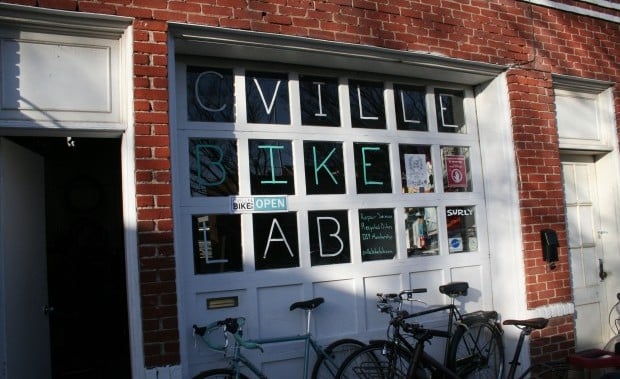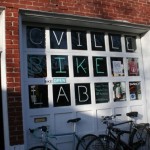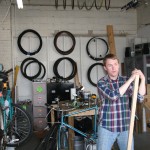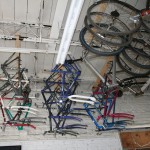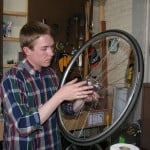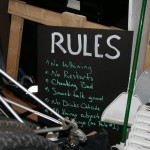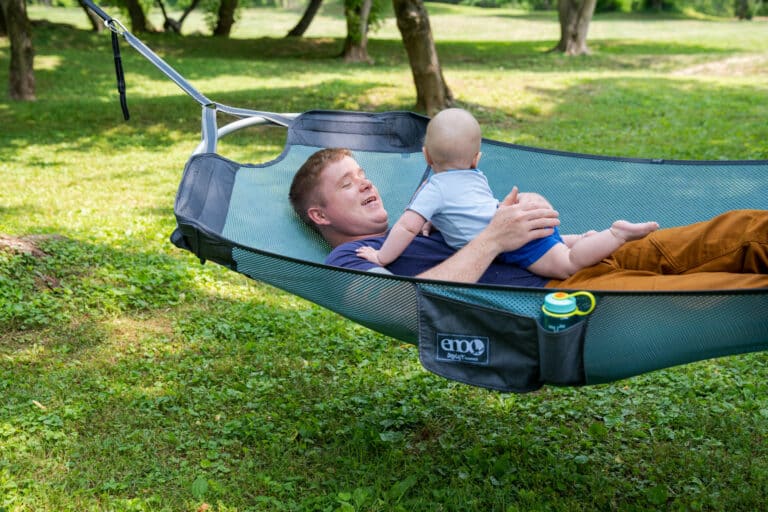The Lab.
The Cville Bike Lab opened a couple months ago on West Main St. in Charlottesville, the chief thoroughfare between downtown and the University of Virginia, with the intent of creating a community space where cyclists of all types can gather to exchange everything from ideas to parts.
Equal parts bike shop, co-op and community center, the Cville Bike Lab is more than a place to buy a bike.
“We lead as a bike shop so we can have solid revenue generation to help us pursue the ideas we really want to scratch,” explains Richmond native and UVa graduate Spencer Ingram. “Part of that idea is having a space, a DIY garage, for folks to come in and work on their own bikes, but have some professional instruction, some manuals, and the opportunity without breaking the budget to pick up the tools and learn.”
If the space is a lab, Ingram is its mad scientist. Ingram started the bike lab with four other partners to try and jump-start what he says is a missing – or at least a minimal – element of a very vibrant cycling scene in Charlottesville: urban riding.
“[Charlottesville] has great shops. We have a spectacular racing scene; and all this with a very small population. But I feel we have an anemic urban culture and need a place for people to learn by example, both traffic safety rider skills and mechanics, and just bikes in general. This is an interaction space as oppose to purely a transaction space,” Ingram says. “It may be idealistic, but democratizing the bike shop space through individuals who are driven to bring something to bicycling in Charlottesville through this resource is our goal.”
Indeed, you can feel the community aspect of the space as soon as you walk through the doors. Old bike frames hang from the ceiling, a new workbench is under construction and the main bench is littered with parts, tools and rags, all covered with a satisfying layer of use and grease. Along the walls hangs art for sale by a local painter and merchandise ranging from lights and saddles to hoodies and handmade refurbished wheel post bottle openers. A dry erase board lists prices for simple repairs as well as mechanics classes and membership information.
“I want to cater our program towards commuters who have no other option but a bicycle, so lets make it a good bicycle. Let’s give them a resource for the flat tire and the maintenance,” he says.
Classes include beginner and advanced mechanics classes and Traffic Skills 101 – Confident City Bicycling, all part of the broader education aspect of the project. Attending classes earns you a membership and access to the tools needed for any repair, along with advice and tips from resident mechanics, almost like a private bike repair lesson. According to Ingram, this enabling of the individual is what powers the Bike Lab and reduce the barriers to going out and riding.
While we chatted, I received a tutorial on the inner workings of the front hub on my fixie, which seized up at the tail end of last fall. I had briefly taken it apart in my own garage, but as ball bearings began falling out I realized I was in over my head. A quick tutorial on cup and cone mechanics, a dismantling and replacement of the ball bearings, a little grease and I was back on the bike. Having it fixed was great, but the important part of the experience was watching Ingram work and having him explain how it all fit together. Next time, I’ll be able to fix it myself.
But Ingram doesn’t just want the Lab to be a place to turn a wrench and pedal away; he wants it to be an urban bicycling community meeting space. Events hosted at the garage include indoor cycling comps, scavenger hunts, and Friday evening rides around town. Experienced city riders lead by example on Friday night rides, which when combined with safety in numbers, induces a casual learning atmosphere for safe riding habits. These events also help create a familiarity between the different subsets of riders – commuters, tri-athletes, road, mountain, bike polo players, etc. – in a “we’re all in this together” mentality.
“Recognize who is riding a bike. We are not ‘others.’ We are your councilmen, business owners, sandwich makers, doctors. We are all riding,” Ingram says.
While we chatted, two UVA co-eds swung by the shop and inquired about buying a used, reliable, cheap bike to ride to class. This, says Ingram, is their bread and butter: taking a trashed ten-speed and replacing the right parts to make it a solid city commuter and selling it on the cheap. After all, they do have to keep the lights on.
For more information on the Cville Bike Lab, including rates and how to become a member, visit their website: www.cvillebikelab.com.
